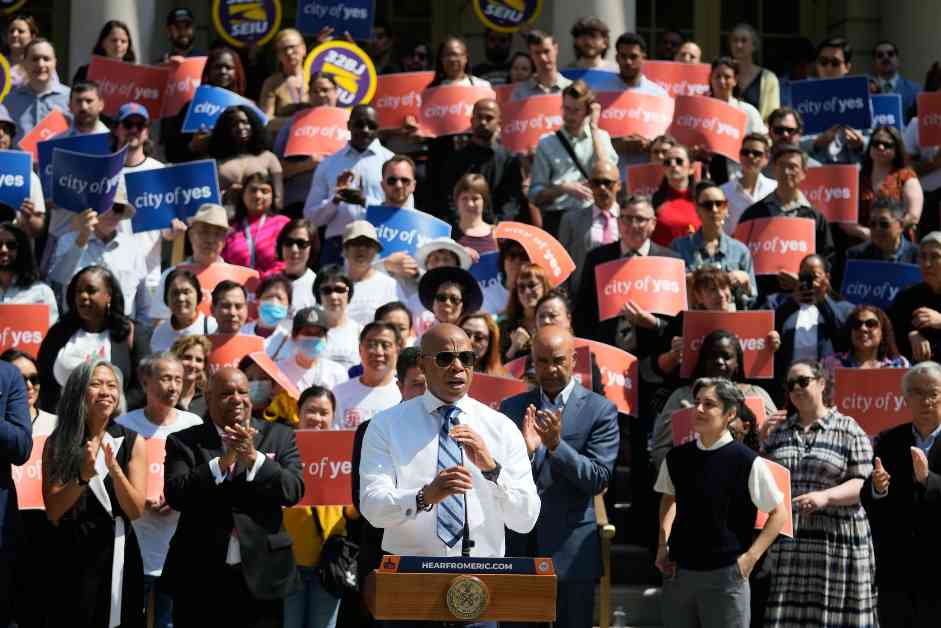Mayor Eric Adams’ bold City of Yes rezoning plan, aimed at increasing housing opportunities in New York City, received a significant boost as the City Planning Commission gave their overwhelming approval by a vote of 10 to 3. This decision sets the stage for a two-month timeline to secure the City Council’s endorsement. However, with Mayor Adams facing an indictment, the fate of the proposal now hangs in the balance.
The proposal, which has been dubbed as one of the most monumental projects in city planning history by CPC Chair Dan Garodnick, seeks to loosen long-standing restrictions on zoning regulations that have hindered housing development in the city. Despite the enthusiasm from supporters of the plan, there are skeptics within the commission and the broader community who have raised concerns about the potential impact of the rezoning on low-density neighborhoods.
Three members of the commission, including Fred Cerullo, Leah Goodrich, and Juan Camilo Osorio, voted against the proposal citing worries about the alteration of neighborhood character and the lack of adequate safeguards for existing communities. These concerns mirror those of residents in low-density areas who fear that the rezoning could lead to drastic changes in their surroundings.
The proposed amendment to the city’s zoning laws includes several key changes aimed at boosting housing development, such as facilitating the conversion of office buildings into residential units, providing density bonuses for projects with affordable housing components, and allowing for increased density in certain areas with existing large buildings. These provisions are crucial in addressing the city’s housing crisis, characterized by a record-low vacancy rate and soaring rents that burden many New Yorkers.
One of the contentious aspects of the proposal is the potential for increased housing in low-density neighborhoods, which has sparked opposition from various quarters. The plan envisions the construction of apartment buildings up to five stories high along commercial corridors and the intensification of development around transit hubs. Additionally, the proposal seeks to eliminate minimum parking requirements for new constructions and permit the use of accessory dwelling units, such as backyard apartments or residential garages, to maximize housing supply.
In response to the concerns raised by opponents, the commission made several revisions to the proposal before its approval. Notably, public housing developments were exempted from certain measures that could conflict with federal regulations, reflecting a compromise to address specific issues raised during the review process. While these changes aim to address some of the criticisms, the overall debate surrounding the City of Yes housing initiative remains heated.
As the proposal now moves to the City Council for consideration, the focus shifts to garnering sufficient support for its passage. The political landscape, however, has been complicated by the recent indictment of Mayor Adams, casting doubt on the plan’s prospects for approval. With the housing crisis looming large and public sentiment largely in favor of the City of Yes initiative, advocates are rallying to ensure its success.
The Yes to Housing coalition, comprising a diverse array of civic and community groups, has been actively promoting the benefits of the rezoning plan through public outreach efforts. A recent poll conducted by the civic group Reinvent Albany revealed strong support for the City of Yes proposal among New Yorkers, with 71% in favor and only 22% opposed. This data underscores the urgency of addressing the city’s housing needs through comprehensive zoning reforms.
In light of the upcoming City Council vote, advocacy groups like Open Plans are mobilizing to advocate for the preservation of key elements of the proposal, such as the elimination of minimum parking requirements. These initiatives aim to streamline the development process and create more housing options for residents, particularly in high-demand areas.
As the debate over the City of Yes housing initiative intensifies, the future of housing development in New York City hangs in the balance. With competing interests and concerns at play, the City Council faces a critical decision that will shape the city’s urban landscape for years to come. As stakeholders on all sides weigh in on the merits and drawbacks of the proposal, the ultimate goal remains clear: to address the pressing housing needs of New Yorkers and ensure a more equitable and sustainable future for all residents.

